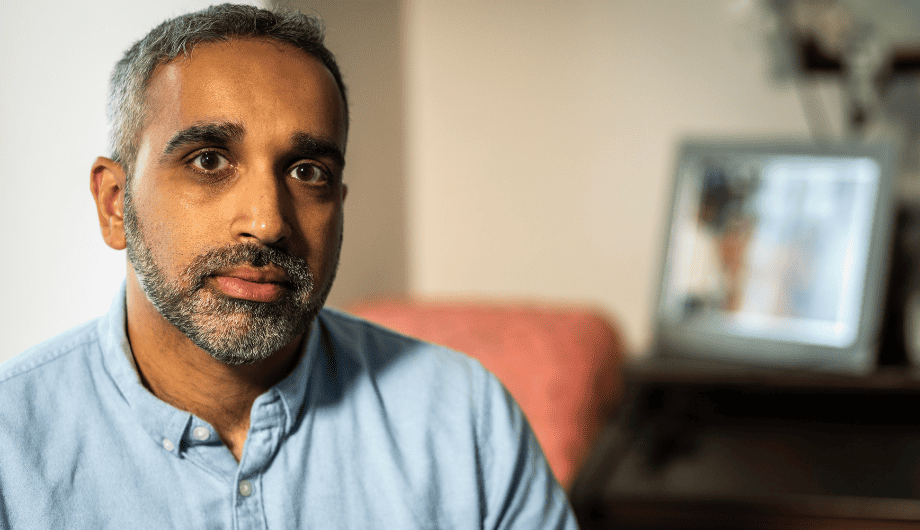
A supportive workplace meant the world after Mum’s diagnosis
When Rosie’s mum, Dawnie, was diagnosed with young onset Alzheimer’s disease, her employer ensured caring responsibilities were fully supported.

Ricky talks about the guilt he felt about as a carer for his Gran, Harbaksh, who had Alzheimer’s disease and died in April, 2024.
Caring for a loved one with dementia is an emotional journey filled with moments of love, frustration, and intense guilt. I think it stems from love, because you want to do everything you possibly can. It doesn’t matter how much love, care and support you provide, you will always have feelings of not doing enough, even when you know you are doing everything that is possible and sometimes even beyond your capacity. It is human nature to always think you can do more.
When Gran was diagnosed with Alzheimer’s, I knew very little about the condition and what to expect. I was very much learning things in real-time. I was constantly reading and researching about the condition. I talked to Admiral Nurses, did an online course and looked to arm myself with as much knowledge as possible. But even having done all that, looking back, the guilt is still there on how I handled some situations and frustrations, particularly early on with repetitive conversations and forgotten memories. If I had my time again knowing everything I do now about dementia, I would have done some things differently. But equally, I have to accept that guilt is a natural emotion and we all did the best we could in a very challenging situation.

As Gran went through the different stages of dementia and gradually declined, there was guilt through every phase of having not done enough earlier. I remember at one stage she would call me five or six times a day at odd hours which could be difficult to manage. It was because she couldn’t remember speaking with me. But when she forgot how to use her phone and the calls stopped, I missed them.
There were other times, she would sing the same few songs on repeat which could become repetitive to listen too, but when she eventually became non-verbal, I would have done absolutely anything to hear her sing any of those songs just one more time. As each stage passes, and you realise things are changing, you feel guilty that you could have done more. It is a feeling that stays with you, but it is not logical and you have to allow yourself empathy.
The reality is that guilt is often misplaced. Caring for someone with dementia is not about perfection, it is about just being there and showing up. You can be too hard on yourself thinking you should have more energy or more patience, but the reality is you have to find a way to have compassion for yourself too. You are doing the best you can and your presence means everything for your loved one.

Hilda Hayo, Dementia UK’s Chief Admiral Nurse and Chief Executive Officer, reflects on Ricky’s experience."Ricky highlights the guilt felt by family members when they believe they did not do enough for a relative with dementia. The reality is that often family members underestimate what they actually do, both for the person with dementia and/or their family carer."
“Ricky highlights the guilt felt by family members when they believe they did not do enough for a relative with dementia. The reality is that often family members underestimate what they actually do, both for the person with dementia and/or their family carer. This feeling of guilt is common when a family member has dementia and is particularly problematic when the family member lives a long way from the person with dementia.
“We lead very busy and complicated lives with many demands on our time and energy and when a family member needs more of our time it can be difficult to accommodate this. Families often say they feel stuck rushing from one thing to another and think that they are not being fully present for anyone, including the person with dementia. This then leads to feelings of guilt not just for what they cannot do for the person with dementia but also for other commitments.
“With these feelings of guilt, it is important to accept that you are human and cannot be everywhere at once or all things to all people. It can help to talk these feelings through with a specialist dementia nurse (Admiral Nurse), they are common feelings and you are not alone.”

When Rosie’s mum, Dawnie, was diagnosed with young onset Alzheimer’s disease, her employer ensured caring responsibilities were fully supported.

Phil highlights the difference it makes when someone living with dementia receives appropriate support in the workplace. He urges employers not to "write someone off" because of their diagnosis.

Glenn shares how flexible working arrangements and support from his managers enables him to continue working whilst prioritising his wife Helen's care.